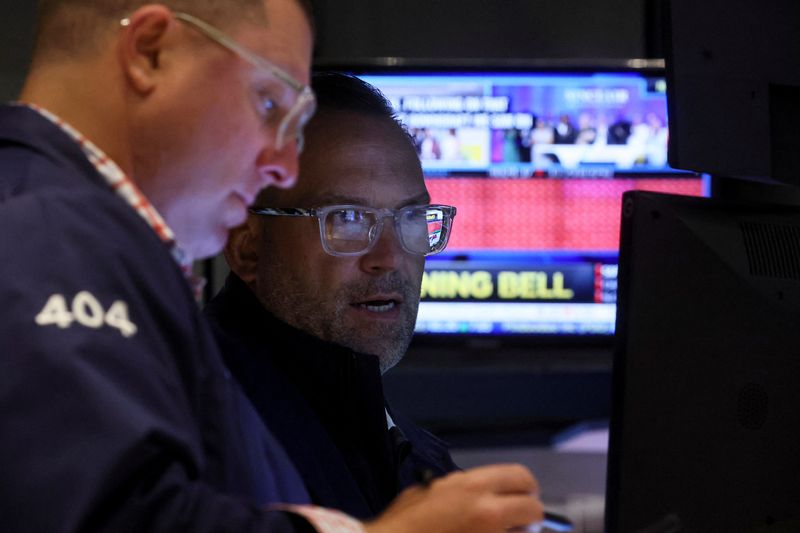 © Reuters. Traders work on the floor of the New York Stock Exchange (NYSE) in New York City, U.S., August 29, 2022. REUTERS/Brendan McDermid
© Reuters. Traders work on the floor of the New York Stock Exchange (NYSE) in New York City, U.S., August 29, 2022. REUTERS/Brendan McDermid
By Chuck Mikolajczak
NEW YORK (Reuters) - A late rally helped the S&P 500 snap a four-session losing skid on Thursday with investor focus turning to a key report on the labor market on Friday.
Stocks had been solidly lower for most of the session, after data showed weekly jobless claims fell more than expected to a two-month low last week and layoffs dropped in August, giving the Fed a cushion to continue raising rates to slow the labor market. Investors now await the monthly nonfarm payrolls report on Friday for more evidence on the labor market.
GRAPHIC: Jobless claims and challenger gray (https://graphics.reuters.com/USA-STOCKS/gdpzyxynovw/joblesschallenger.png)
Economists polled by Reuters see a jobs increase of 300,000, while Wells Fargo (NYSE:WFC) economist Jay Bryson revised his forecast for nonfarm payrolls to 375,000 from 325,000 and Morgan Stanley (NYSE:MS) economist Ellen Zentner expects August payrolls of 350,000.
"Today's market is about tomorrow morning. You've got a market that is oversold ... and a catalyst for a rally or at least not to sell off would be a weaker employment report especially with regard to wages," said Quincy Krosby, chief global strategist for LPL Financial (NASDAQ:LPLA) in Charlotte, North Carolina.
"The market is as data-dependent as the Fed. It's going to be on guard for every data release that could suggest when the Fed could be closer to finishing."
The S&P managed to bounce in the latter stages of trading after hitting a low of 3,903.65, near what some analysts see as a strong support level for stocks at 3,900.
The Dow Jones Industrial Average rose 145.99 points, or 0.46%, to 31,656.42; the S&P 500 gained 11.85 points, or 0.30%, to 3,966.85; and the Nasdaq Composite dropped 31.08 points, or 0.26%, to 11,785.13.
The benchmark S&P index has stumbled nearly 6% over the prior four sessions, which began after Fed Chair Jerome Powell signaled on Friday the central bank will remain aggressive raising rates to fight inflation even after consecutive hikes of 75 basis points, a message echoed by other Fed officials in recent days.
Despite the gains, the tone was defensive, with healthcare up 1.65%, and utilities, which gained 1.42%, the leading sectors to the upside.
Weighing on the tech sector, down 0.48%, were chipmakers as the Philadelphia semiconductor index dropped 1.92%, led by a 7.67% tumble in shares of Nvidia (NASDAQ:NVDA) as the biggest weight on the S&P 500, and a 2.99% fall in Advanced Micro Devices (NASDAQ:AMD) after the United States imposed an export ban on some top AI chips to China.
Other economic data showed a further easing in price pressures, while manufacturing grew steadily in August, thanks to a rebound in employment and new orders.
Traders expect a 73.1% chance of a third straight 75 basis points increase in rates in September and expect it to peak around 3.993% in March 2023.
The expected path of Fed rate hikes has increased worry the central bank could potentially make a policy mistake and raise rates too high, tilting the economy into a recession, even if inflation shows signs of abating.
Investors have also become more concerned about corporate earnings in a rising rate environment that has also stoked a rally in the U.S. dollar. Hormel Foods Corp (NYSE:HRL) fell 6.56% after the packaged foods maker cut its full-year profit forecast.
Volume on U.S. exchanges was 11.19 billion shares, compared with the 10.51 billion average for the full session over the last 20 trading days.
Declining issues outnumbered advancing ones on the NYSE by a 2.82-to-1 ratio; on Nasdaq, a 1.96-to-1 ratio favored decliners.
The S&P 500 posted one new 52-week high and 35 new lows; the Nasdaq Composite recorded 29 new highs and 356 new lows.

